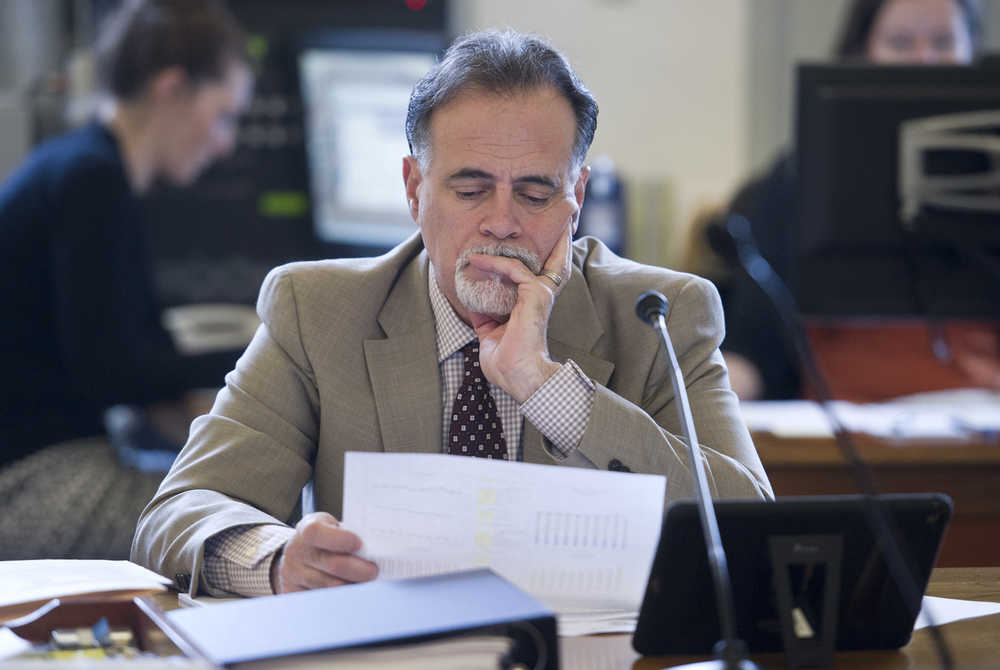The Alaska Senate Finance Committee has unveiled its plan to fill much of the state’s $4.1 billion annual deficit using the Alaska Permanent Fund.
In a Tuesday afternoon meeting, Sen. Anna MacKinnon, R-Anchorage and co-chairwoman of the committee, debuted “in pencil — per the governor — a committee substitute for Senate Bill 128.”
Senate Bill 128, proposed by Gov. Bill Walker earlier this year, proposed turning the $52.2 billion Permanent Fund into a money factory generating $3.3 billion per year from its investments for state operations.
The new proposal takes Walker’s notion and blends it with Senate Bill 114, a similar notion proposed by Sen. Lesil McGuire, R-Anchorage, last year.
“I think this is a huge step forward. We diversify our revenue stream by almost 40 percent under this proposal,” MacKinnon said.
Randall Hoffbeck, the state’s revenue commissioner, was in the audience as MacKinnon presented the compromise.
“We have a mechanism now for using the earnings reserve, and that’s a major step forward,” he said.
Instead of drawing a fixed amount, the compromise plan draws a fixed percentage, 5.25 percent of the Permanent Fund’s average year-end value for five of the six previous fiscal years.
Of that draw, 20 percent would be reserved to pay the Alaska Permanent Fund Dividend. The plan guarantees a $1,000 dividend from 2017 to 2020, and the dividend would float after that, likely generating between $900 and $1,000 for every Alaskan, according to projections provided Tuesday.
Without a change, the dividend would be $2,000 or more this year. The state would also stay on course to run out of savings by 2021.
That fear — of running out of money to pay for state operations — is driving the compromise proposal and the ones suggested by Walker, McGuire and a fourth option proposed in the House by Rep. Mike Hawker, R-Anchorage.
Most of the Permanent Fund, $45.6 billion, is constitutionally protected and can’t be spent. The earnings reserve, which collects the investment earnings of the fund and held $7.1 billion as of Feb. 29, can be spent, and it’s what the four plans rely upon.
According to the MacKinnon plan, the Permanent Fund would continue to grow even if the earnings reserve is spent. It, like the governor’s plan, is predicated upon the fund earning an average of 6.9 percent on its investments. The fund would also continue to receive 25 percent of the state’s oil and gas royalties, which are deposited into the corpus.
“You’re earning 6.9 percent but paying out 5.25 percent or really lower than that,” said David Teal, director of the Legislative Finance Division.
There are two principal differences beyond the type of draw between the compromise plan and the governor’s proposal. The first is that the compromise does not sweep the state’s $8.2 billion Constitutional Budget Reserve into the Permanent Fund. Walker had suggested that as a way to supercharge the fund for long-term investment and protect it from events like the Great Recession.
The compromise plan also ensures a higher dividend than Walker’s proposal does.
As a result of that higher dividend, it doesn’t close the deficit as much as Walker’s proposal does — at the current value of the Permanent Fund, it would generate about $2 billion per year instead of $3.3 billion.
According to projections, if the compromise were enacted this year, the state would still have a deficit of $2.2 billion in Fiscal Year 2017, which starts July 1.
That deficit would be present even with almost $250 million in budget cuts and about $20 million in cuts to the state’s oil and gas drilling subsidies.
“This is the Senate’s best proposal at this time to fulfill, to close the budget gap and to not impact individual Alaskans with taxes,” MacKinnon said.
To make ends meet in 2017, the state would use about a quarter of its Constitutional Budget Reserve.
More subsidy cuts are expected in FY2018, and the impact of reforms to Medicaid and the state’s prison system will also have an impact. With oil prices expected to rise only slightly, the deficit is expected to shrink to about $1.6 billion, barring spending increases. That’s low enough to be filled with more spending from the budget reserve.
The long-term view also calls for a state undesignated general fund budget of about $4.5 billion per year, plus about $700 million for dividends.
Barring a spike in oil prices or significant tax increases, the compromise plan would not balance the state’s budget through at least 2026, but the deficit would shrink to the point that the budget reserve could pay for it each year.
The remaining deficit could also be resolved by other tax increases or an unexpected rise in oil prices. Walker has proposed raising additional taxes to balance the budget by 2019; debate on those tax bills has stalled.
“This does not solve all of Alaska’s problem, but it goes a long way,” MacKinnon said.
Hearings on the plan have been scheduled for Wednesday and Thursday.
• Contact reporter James Brooks at james.k.brooks@juneauempire.com.


